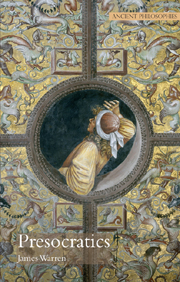Book contents
- Frontmatter
- Contents
- Acknowledgements
- Sources and abbreviations
- Chronology
- Map of the ancient Mediterranean
- 1 Introduction: reading Presocratic philosophy
- 2 Ionian beginnings
- 3 Xenophanes
- 4 The oracles of Heraclitus
- 5 Parmenides
- 6 Reactions to Parmenides
- 7 Anaxagoras
- 8 Empedocles
- 9 Democritus and Leucippus
- 10 Epilogue
- Guide to further reading
- Notes
- Bibliography
- Index of passages
- Index
7 - Anaxagoras
- Frontmatter
- Contents
- Acknowledgements
- Sources and abbreviations
- Chronology
- Map of the ancient Mediterranean
- 1 Introduction: reading Presocratic philosophy
- 2 Ionian beginnings
- 3 Xenophanes
- 4 The oracles of Heraclitus
- 5 Parmenides
- 6 Reactions to Parmenides
- 7 Anaxagoras
- 8 Empedocles
- 9 Democritus and Leucippus
- 10 Epilogue
- Guide to further reading
- Notes
- Bibliography
- Index of passages
- Index
Summary
At some point relatively early in his life, Anaxagoras moved from his home town of Clazomenae, just North of Colophon in Asia Minor, to Athens. That he should have chosen to leave Ionia and head west indicates Athens' growing power and influence in the Aegean. It also shows its growth as a major philosophical centre as its cultural and intellectual attractions increased along with its political power. There is good reason to think that Anaxagoras was quite a prominent intellectual in his time and moved in important circles. He was associated with the leading Athenian statesman Pericles, and might even have attracted unwelcome attention and litigation from Pericles' enemies, who seized on Anaxagoras' views as an expression of unusual and potentially damaging religious opinions. Significant continuous stretches of his work survive, mainly as quotations by the Aristotelian commentator Simplicius. He wrote prose in a dogmatic and solemn style and is rightly famous for an unusual conception of matter and the introduction of nous, or mind, as some kind of causal principle.
Coming to be
We can begin our exploration of Anaxagoras' physical system by considering his response to a surprising question, one that he may have posed himself. Fragment DK 59 B10 is sometimes considered to be inauthentic, but most agree that even if it does not preserve a genuine piece of Anaxagoras' work, it nevertheless encapsulates a genuine Anaxagorean thought: “For how could hair come to be from not hair and flesh from not flesh?” We should note the Eleatic echoes.
- Type
- Chapter
- Information
- Presocratics , pp. 119 - 134Publisher: Acumen PublishingPrint publication year: 2007



